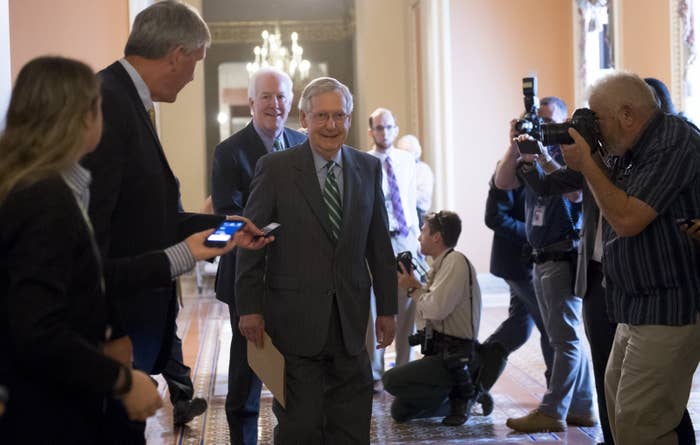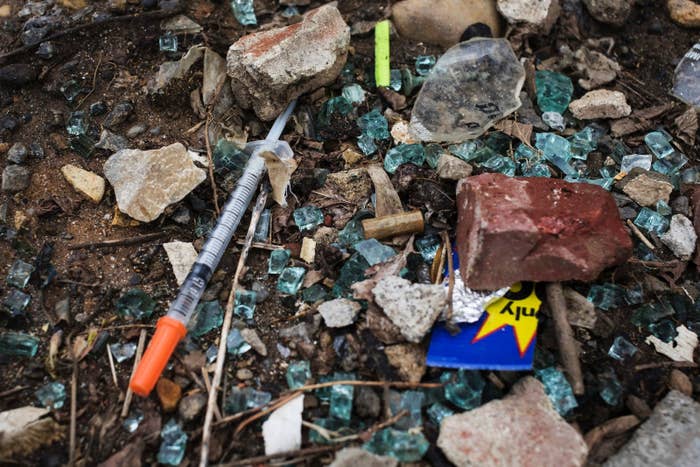
Many people addicted to prescription painkillers and heroin — some 2.6 million nationwide — would face tougher odds of recovery under a draft Senate health care bill released on Thursday, according to addiction experts.
In the midst of a nationwide overdose epidemic, the draft Senate bill would provide only $2 billion for recovery treatment programs for one year — even less than the $45 billion over 10 years offered in the health care bill that passed the House in early May, which had itself faced criticism as too paltry.
“It is a death sentence for millions of Americans,” Gary Mendell of Shatterproof, a nonprofit that advocates for addiction treatment, told BuzzFeed News. “It is mind-boggling to me that our lawmakers would take treatment away at a time when people need it most.”
The US is in the midst of a nationwide addiction crisis, with 2.6 million people addicted, and overdose deaths tripling in the last 15 years, to 33,000 in 2015. Medicaid, along with federal children’s health programs, now covers roughly 3 out of every 10 people addicted to opioid painkillers or heroin nationwide, a number that expanded after the passage of Obamacare in 2010.
The draft Senate bill, which is expected to go up for a vote next week, would cut $830 billion from Medicaid funds, which largely cover young and middle-aged people most at risk of addiction. The cuts would strike at a Medicaid expansion that was accepted by 32 states to increase the number of poor people with health insurance.
In 2013 alone, the opioid crisis is estimated to have cost the US some $78 billion in medical costs, lost productivity, and law enforcement costs.
“Without access to treatment for substance use disorder, people are going to relapse. Then the risks of overdose, of contracting Hepatitis C, are obviously heightened,” Grant Smith of the Drug Policy Alliance told BuzzFeed News. He called the $2 billion “a drop in the bucket” compared to nationwide shortfalls in effective treatment programs.
Some Republicans, however, say Medicaid isn’t doing a great job of helping opioid addicts. At a recent budget hearing, Health and Human Services Secretary Tom Price was questioned about how much difference Medicaid actually makes in the opioid crisis. “The programs that are out there, by and large, are not working," he said, pointing to a rising death toll from overdoses.
Medicaid currently covers almost 75 million people. In all 50 states, the program pays for at least one form of medication-assisted treatment, such as providing less potent opioids like methadone or buprenorphine, along with years of counseling.

States such as Ohio, which added 680,000 people under the Medicaid expansion, and Kentucky, which added 440,000 people, have been hard hit by the opioid crisis. Medicaid now pays for almost half of all buprenorphine prescriptions nationwide.
“We’re really putting at risk the great strides made in making treatment more available to more people,” Kelly Clark of the American Society of Addiction Medicine told BuzzFeed News. Medication-assisted treatment is already hard to get in many states, and efforts to increase physician training and services will be undercut if patients no longer have Medicaid, she said.
Mendell said he suspects that the $2 billion figure in the Senate bill is just political "smoke and mirrors." The low number will attract news attention, he predicted, until an amendment to the bill is offered next week restoring the $45 billion over ten years provided for in the House version of the bill. Moderate Republican senators, Mendell said, "will declare themselves heroes, and vote for it."
But even that additional cash — $4.5 billion a year for a decade — is just a drop in the bucket compared to the estimated $50 billion a year needed to ensure addiction treatment for everyone who wants it, Mendell said. "We as a society created this epidemic, and now to walk away from these people. How can that happen?"
At the White House’s recent opioid crisis commission meeting headed by Gov. Chris Christie of New Jersey, Mendell and other advocates for treatment had pleaded for continued Medicaid coverage of recovery treatment.
What’s more, the cuts to Medicaid will likely show up later as increased disability claims in states, Kathleen Romig of the Center on Budget and Policy Priorities told BuzzFeed News. And the health of people on disability will be worse because they didn’t receive the preventive care paid for by Medicaid.
“Many people become addicted to opioids because of chronic pain caused by an illness or injury,” Romig said. “If people have health care, they are more likely to treat that underlying problem appropriately.”

